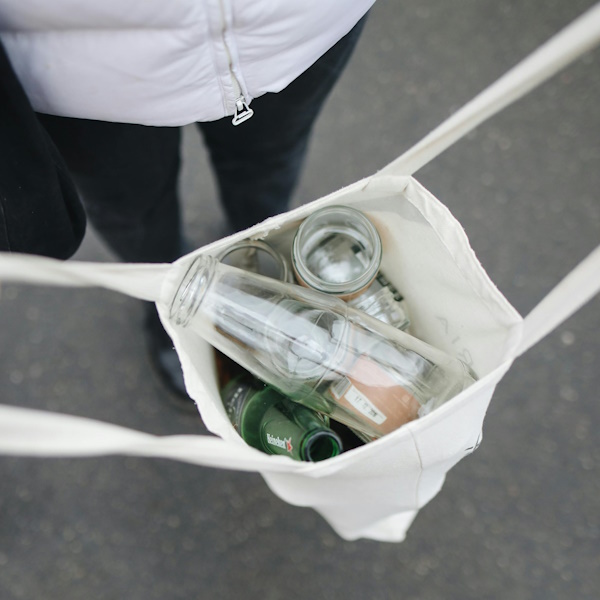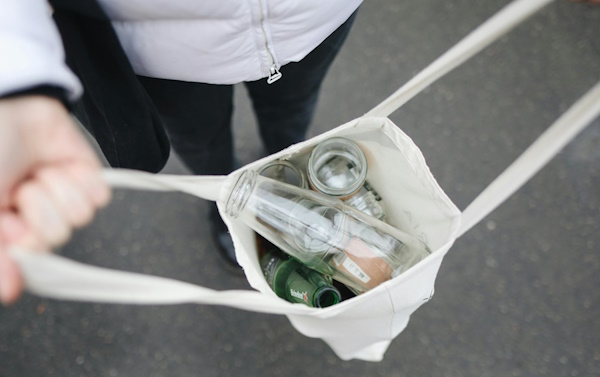Zero-Waste Shopping Guide: Sustainable Choices for a Greener Life
Embarking on a zero-waste shopping journey might seem daunting at first, but it's an incredibly rewarding path that aligns with a sustainable lifestyle. It's about making mindful choices, reducing your carbon footprint, and saying no to unnecessary packaging. Whether you're a seasoned eco-warrior or just starting out, zero-waste shopping offers a plethora of benefits for both the planet and your personal well-being.
Imagine walking out of a store, your reusable bags brimming with bulk foods, fresh produce, and eco-friendly products, all without a single piece of disposable packaging in sight. That's the essence of zero-waste shopping. It's not just a trend; it's a movement towards a more sustainable and conscious way of living. Let's dive into how you can make this vision a reality, one purchase at a time.
What is Zero-Waste Shopping?
Zero-waste shopping is a lifestyle choice that aims to drastically reduce and eventually eliminate the amount of trash individuals produce. It's all about making conscientious purchasing decisions that align with the principles of sustainability and environmental stewardship. At its core, zero-waste shopping advocates for buying items with minimal to no packaging, opting for reusable and recyclable materials, and supporting products that have a lesser impact on our planet.
When you embark on a zero-waste shopping journey, you're not just buying food or household items; you're making a commitment to protect the environment. This involves selecting products that are sold in bulk, bringing your own containers and bags to stores, and choosing items made from sustainable, non-toxic materials. It's a holistic approach to consumerism that encourages you to think about the lifecycle of the products you purchase, from production to disposal.
- Bulk buying: Purchase food and other products in bulk using your own containers to avoid unnecessary packaging.
- Reusable materials: Opt for items that come in reusable or recyclable packaging, or better yet, no packaging at all.
- Sustainable products: Choose products made from materials that have a minimal environmental impact, such as bamboo, glass, or recycled paper.
By adopting zero-waste shopping practices, you not only reduce your carbon footprint but also contribute to a larger movement towards a more sustainable and ethical consumer culture. It's about making mindful choices that reflect a respect for our planet and its future. Remember, every small change in the way we shop can lead to significant environmental benefits over time.
Benefits of Zero-Waste Shopping
Embarking on a zero-waste shopping journey not only benefits the planet but also enriches your lifestyle in several ways. By choosing to shop with minimal waste, you're stepping into a world where each decision you make has a positive impact.
Financial Savings are one of the most compelling benefits you'll notice. Buying in bulk and avoiding pre-packaged goods often results in significant cost reductions. Think about the premium you pay for brand-name packaging and the convenience of single-use products. When you bypass these, you're essentially paying less for more.
Secondly, embracing Healthier Options becomes second nature. Zero-waste shopping tends to guide you towards fresh, unprocessed foods and eco-friendly products. By cutting out unnecessary packaging, you're also cutting out the preservatives and chemicals often found in packaged goods. This shift can lead to a healthier diet and lifestyle.
The Environmental Impact of zero-waste shopping is profound. By refusing single-use plastics and opting for sustainable, reusable options, you're directly contributing to the reduction of pollution and greenhouse gas emissions. The following table highlights the notable differences in carbon emissions between packaged and bulk items:
| Item Type | Carbon Emissions |
|---|---|
| Packaged Goods | High |
| Bulk Purchases | Low |
Furthermore, zero-waste shopping encourages a Closer Community Connection. Shopping at local farmers' markets and bulk stores fosters a sense of community. You'll find yourself engaging more with local farmers, small business owners, and fellow eco-conscious shoppers. These interactions not only enrich your shopping experience but also support the local economy.
Adopting a zero-waste lifestyle through mindful shopping practices does more than just save you money and promote a healthy lifestyle; it connects you with your community and contributes to a healthier planet.
How to Prepare for a Zero-Waste Shopping Trip
Embarking on a zero-waste shopping journey starts long before you step foot in a store. Proper preparation is key to ensuring you're not only efficient but also true to your sustainable goals. Here’s how you can gear up for a successful trip.
First and foremost, inventory your current supplies. You don’t want to overbuy or purchase what you don’t need. Take stock of your pantry and fridge to avoid duplicates, which can lead to food waste. This initial step not only saves you money but also keeps your kitchen clutter-free and aligned with zero-waste principles.
Next, gear up with the right reusable containers. Equip yourself with a variety of sizes for bulk items, liquids, and produce. Glass jars, cloth produce bags, and stainless-steel containers are great options. Remember to pre-weigh your containers if your store allows, to ensure you’re only paying for the contents.
Plan your shopping list around bulk and unpackaged goods. Farmers' markets and zero-waste stores offer an abundance of these options. Focusing on these outlets supports local producers and reduces the need for long-distance food shipping, further cutting down your carbon footprint.
Lastly, familiarize yourself with the locations that accommodate zero-waste shopping. Not all stores will have bulk bins or allow you to use your containers. Doing a bit of research beforehand can save you time and help you support businesses that are committed to sustainability.
By organizing, equipping yourself properly, and knowing where to shop, you're setting the stage for a successful zero-waste shopping experience. Each trip not only contributes to your personal sustainability goals but also propels the wider community towards a more eco-conscious way of living.
Finding Zero-Waste Grocery Stores
Embarking on your zero-waste shopping journey necessitates identifying where to shop. Zero-waste grocery stores are sprouting up in many areas, prioritizing waste reduction and offering products without disposable packaging. These stores offer bulk food, personal care, and cleaning supplies that allow you to refill your containers, significantly cutting down on plastic waste.
Here's how you can find zero-waste grocery stores in your area:
- Search Online: A quick online search for "zero-waste stores near me" can yield a surprising number of options. Websites and apps dedicated to sustainable living often list zero-waste grocery stores by location.
- Social Media and Forums: Social media platforms and eco-conscious forums are great places to ask for recommendations. Many cities have Facebook groups or Reddit threads where locals share tips on sustainable living.
- Farmers Markets: While not strictly zero-waste, farmers markets often offer fresh produce without plastic packaging. Many vendors are happy to place their goods directly into your reusable bags.
Once you've located a few stores or markets, it's crucial to visit their websites or contact them directly for information on their products, packaging policies, and whether they allow customers to bring their own containers. This prep work ensures your shopping trip aligns with your zero-waste goals.
Remember, not every city has dedicated zero-waste stores. If that’s the case for you, don’t worry. Many regular grocery stores have bulk sections that can be a good starting point for your zero-waste shopping. Additionally, shopping for unpackaged produce and bringing your reusable bags and containers can significantly reduce waste, even in conventional stores.
As zero-waste shopping gains popularity, more stores are beginning to accommodate the needs of environmentally conscious consumers. By supporting these businesses and making your preferences known, you're not only making a personal impact but also encouraging more retailers to consider zero-waste options.
Tips for Zero-Waste Shopping
Embarking on your zero-waste shopping journey can seem daunting at first. However, with the right tips and a bit of preparation, you'll find it's easier than you think. Here are some essential tips to help streamline your zero-waste shopping experience and make it both enjoyable and effective.
Know Your Stores: Familiarize yourself with the stores in your area that support zero-waste shopping. Look for those that offer bulk bins, accept reusable containers, and have a wide variety of unpackaged products. Remember, farmers markets are also a goldmine for fresh, unpackaged produce.
Invest in Quality Reusables: Make sure you have a set of quality reusable bags, containers, and bottles. These are indispensable for carrying your groceries, storing bulk items, and avoiding the need for disposable packaging. Opt for materials like cotton, glass, or stainless steel for their durability and eco-friendliness.
- Reusable bags for produce and general shopping
- Glass or stainless steel containers for bulk items
- Reusable bottles for liquids like oils and vinegars
Plan Your Shopping List: Careful planning can prevent impulse buys and ensure you only purchase what you need. Base your shopping list on your meal plans for the week and stick to it. This not only reduces waste but can also save you money in the long run.
Be Prepared to Compromise: Sometimes, finding a zero-waste option for everything on your list isn't possible. When this happens, choose the next best thing. Products with minimal, recyclable, or biodegradable packaging are preferable to those in non-recyclable packaging. It's about making the best choice available.
Embracing zero-waste shopping doesn't happen overnight. It's a gradual process of changing your habits and making more environmentally friendly choices every time you shop. Remember, every small step counts towards reducing waste and minimizing your carbon footprint. Keep these tips in mind, and you'll be well on your way to a more sustainable lifestyle.
Conclusion
Embracing zero-waste shopping isn't just a trend—it's a meaningful step towards a sustainable future. By preparing adequately and choosing to support businesses that align with eco-friendly practices, you're contributing to a larger movement of mindful consumption. Remember, every reusable container and every piece of unpackaged produce counts in reducing your carbon footprint. It's about making informed choices, adapting to available options, and gradually shifting towards a more sustainable lifestyle. So, take that step, fill your reusable bags with confidence, and know that you're making a difference, one zero-waste shopping trip at a time.







